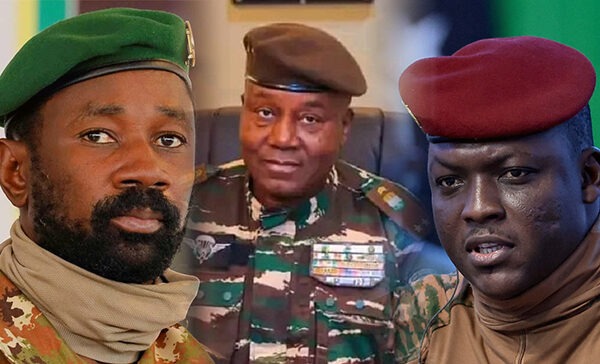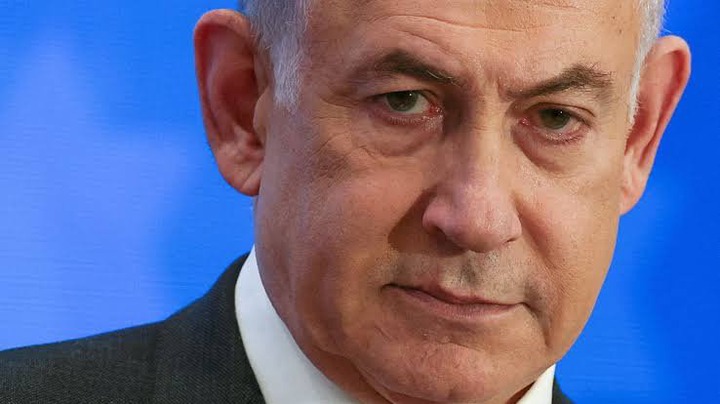A string of coups in the central Sahel continues to reverberate in West Africa. The central Sahel states of Burkina Faso, Mali, and Niger — all of which are now ruled by military juntas — are grappling with multifaceted conflicts as various rebel movements and jihadi groups challenge state authority, adding fuel to a dire humanitarian crisis.ALSO READ HERE: FULL. VIDEO; BEAUTIFUL. WIFE. C4UGHT. P4NT. DOWN. WITH. NEIGHBOR ...Tap To Read The Full Story Here | ..Tap To Read The Full Story Here...
Military officers seized power in coups in the three countries between 2021 and 2023. Each of the junta leaders justified their military takeovers by claiming to seek to restore security. However, the conflicts continue and the juntas are far from fulfilling their promises to improve stability and security.
Data from the Armed Conflict Location and Event Data Conflict Index (ACLED) shows that insurgencies in the Sahel have worsened as conflict fatalities from political violence increased to 38 per cent in 2023, and civilian fatalities grew to 18 per cent in 2022.
In 2023, the head of the UN Office for West Africa and the Sahel warned that armed conflicts have worsened human suffering and forced millions to flee. Roughly 2.7 million people have been displaced and 1.6 million children are malnourished, according to UN estimates.
As a result of the deteriorating conflict, the epicentre of global terrorism “has now conclusively shifted out of the Middle East and into the Central Sahel region,” according to the Global Terrorism Index.
Dangote Refinery
Sub-Saharan Africa accounted for 47 per cent of global terrorism deaths in 2023, more than South Asia, the Middle East, and North Africa combined. Five of the ten countries most affected by terrorism in 2023 are in Africa: Burkina Faso (first place), Mali (third), Somalia (seventh), Nigeria (eighth), and Niger (tenth).
Although Nigeria is facing its own internal insurgencies, Africa’s most-populous country is also threatened by the instability in Burkina Faso, Mali, and Niger. For instance, If Niger collapses or continues to lose central authority, it could allow Jihadists in the Sahel to enter Nigeria more freely, as Niger has served as a buffer between the instability in the Central Sahel and Nigeria.
Nigerians need credible journalism. Help us report it.
Support journalism driven by facts, created by Nigerians for Nigerians. Our thorough, researched reporting relies on the support of readers like you.
Help us maintain free and accessible news for all with a small donation.
Every contribution guarantees that we can keep delivering important stories —no paywalls, just quality journalism.
“Both IS-Sahel and Jama’at Nusrat al-Islam wal Muslimeen (JNIM) probably have ambitions to expand into Nigeria and other coastal states but are constrained at the minute by distance and the fight against the Malian, Burkinabe, and Nigerien governments,” Nathaniel Powell, Africa analyst at Oxford Analytica told PREMIUM TIMES.
“Certainly, some JNIM elements in Benin are very close to the Nigerian border, as with some IS-Sahel fighters in Niger. Also, in the longer term, major jihadist expansion into Benin and across Niger would pose a clearer threat to Nigeria,” he said.
Although rich in mineral resources, the central Sahel has a long history of political instability, armed rebellions and bad governance. Insurgents have taken control of large parts of the region and fought against government forces and local populations for resources. Civilians are often caught in the middle. Despite long-standing international and regional efforts to combat insurgents, these groups continue to expand their presence across the region.
Traditional anti-terror campaigns have failed to stop the violence and a broken relationship with the main political and economic bloc in the region has further exacerbated regional tension. On 28 January, Burkina Faso, Mali and Niger – announced that they were exiting the Economic Community of West African States (ECOWAS).
These events are especially salient for Nigeria, the largest country in ECOWAS and the site of its headquarters. The three Sahelian countries’ exit from ECOWAS could hurt regional cooperation in curbing the activities of jihadists, bandits and transnational crime syndicates, worsening insecurity, especially in northern Nigeria.
Audience Survey
Many Nigerians who have commercial, cultural and even marital affinities with Niger have welcomed the lifting of ECOWAS sanctions, which were hurting their livelihoods as well. But diplomats and analysts in Abuja have also expressed concerns that the attempts to placate Niger’s junta may have set a dangerous precedent, weakening the bloc and adversely affecting Nigeria’s position therein.
Arguably, security is the sector most affected by the exit of the three Sahelian countries from ECOWAS. Following their exit, they announced the formation of the Alliance of Sahel States (AES). Their withdrawal from ECOWAS, particularly that of Niger, could diminish security cooperations and curb operations of the Multinational Joint Task Force (MNJTF), which has been helping counter the jihadist insurgencies in the Lake Chad basin.
Mr Powell said the three Sahelian countries desperately need security cooperation and economic ties with other states in the region. “West Africa’s disintegration into two sorts of blocs does not make that easy, even if ties are easing between Nigeria and Niger.”
In August, a Nigerian delegation led by defence chief Christoper Musa was in Niger to further negotiate with the junta. Analysts said despite efforts to try to heal ECOWAS’s rift with the three departed states, success is likely to remain elusive.
“Whatever one thinks of it, I don’t think the Alliance of Sahel States (AES) will be returning to ECOWAS in the near future, and certainly not with their current governments,” Mr Powell told PREMIUM TIMES, adding, “One can only hope that their promises of enhanced cooperation and coordination in a variety of domains, not least of which is security, will actually prove effective because they desperately need it.”
The deterioration of relations between Abuja and Niamey also jeopardises – and could eventually scuttle – two important projects: a 284-kilometre railway connecting the two countries second-largest cities (Kano in Nigeria and Maradi in Niger); and the ambitious 4,100-kilometre Trans-Saharan Gas Pipeline that could deliver as much as 30 billion cubic metres of Nigeria’s natural gas to Europe each year.
Amid the regional melee, international alliances also remained in flux after military juntas in the three Sahel countries cut ties with former colonial power France. Instead, they befriended Russia, buying weapons and deploying fighters with the mercenary Wagner Group, now known as the Africa Corps.
For the past decade, pro-Russian sentiments have been growing in West Africa, where coup leaders increasingly welcome Moscow. Ties between the United States and the Sahelian countries have also worsened. Following the coups, the Biden administration suspended the countries’ free trade access to US markets. Large-scale human rights issues also triggered laws that prohibit the provision of US military or training assistance to countries of concern.
While US officials have expressed alarm about Russia’s presence in the Sahel, the Biden administration appears neither inclined nor able to provide any alternative security assistance, according to a report by Carnegie Endowment.
Similarly, despite Russia’s increasing involvement in the region, armed groups have stepped up their attacks, particularly in Burkina Faso, demonstrating their might, regardless of whether incumbent regimes are quasi-democratically elected or led by the military.
In August, Russia withdrew 100 of its paramilitary officers from Burkina Faso to help in the war in Ukraine. They are part of about 300 soldiers from the Bear Brigade – a Russian private military company – who arrived in the West African nation in May to support the country’s military junta. Reports said their sudden departure is linked to the recent Ukrainian offensive in Russia’s Kursk region.
There are fears the pull-out could embolden insurgents in Burkina Faso, who recently killed up to 300 people in one of the biggest attacks in years.
Bulama Bukarti, a security expert and senior fellow at the Tony Blair Institute for Global Change, said as the conflict between Russia and Ukraine escalates, Russia may be forced to completely withdraw from the Sahel, especially if Ukraine’s offensive gains further momentum.
ALSO READ: INTERVIEW: Terrorism may worsen in Nigeria, other Sahel countries – Ex-ECOWAS Commissioner
“This leaves Burkina Faso, along with Niger and Mali with limited options to address the growing security vacuum, likely empowering groups like JNIM and ISGS, who will be further emboldened by Russia’s retreat,” Mr Bukarti said. “The sooner these countries retrace their steps and repair their strained alliances, the better for everyone.”
Analysts said the tumult in the central Sahel is, at least in part, a reflection of Nigeria’s diminished influence in West Africa. Nigeria’s influence has been slipping for over a decade as the country has grappled with security and economic challenges.
Nigeria has been unable to lay out and rally the bloc to a strategic vision for regional development and security. The West African giant has been preoccupied with several domestic security challenges, including the Boko Haram/ISWAP insurgency in the North-east, banditry in the North-eest, herder-farmer tensions in the North-central zone, and deepening insecurity associated with the IPOB agitation in the South-east.
Embattled at home, Nigeria also sometimes pursued its priorities with apparently scant regard for collective interests. For instance, from August 2019 to December 2020, the country closed its land borders with neighbours – Chad, Cameroon, Benin and Niger – in a bid to curb the smuggling of produce, firearms and refined petroleum products. The closure, which did little to reduce smuggling, violated an ECOWAS agreement guaranteeing freedom of movement, hurting the economies of nearby countries and sowing mistrust.
Analysts said a break-up appears inevitable between ECOWAS and the Sahel countries. If that happens, the two parties must strive to engage in constructive dialogue in the interest of a stable region.ALSO READ HERE: 18+ 3:00 MINUTES. H0T. VIDEO. OF. PASTOR’S. WIFE. LE4KED
“Obviously, the AES breakaway will negatively affect regional cooperation, but this was never as effective or cooperative as its proponents hoped for or claimed in the best of times. At least bilateral ties between Niger and Nigeria seem to be improving, with the prospect of resumed security cooperation. This is vital, although not sufficient for addressing both countries’ shared threats,” Mr Powell said.For More READ THE FULL STORY▶▶



